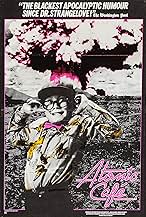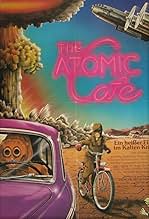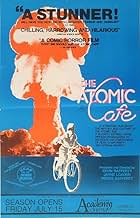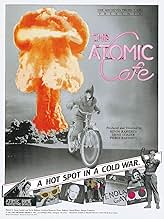AVALIAÇÃO DA IMDb
7,6/10
4,7 mil
SUA AVALIAÇÃO
Perturbadora coleção de filmes de propaganda emitidos pelo governo americano nos anos 40 e 50, destinados a assegurar aos americanos que a bomba atômica não era uma ameaça à sua segurança.Perturbadora coleção de filmes de propaganda emitidos pelo governo americano nos anos 40 e 50, destinados a assegurar aos americanos que a bomba atômica não era uma ameaça à sua segurança.Perturbadora coleção de filmes de propaganda emitidos pelo governo americano nos anos 40 e 50, destinados a assegurar aos americanos que a bomba atômica não era uma ameaça à sua segurança.
- Indicado para 1 prêmio BAFTA
- 2 vitórias e 1 indicação no total
Paul Tibbets
- Self
- (cenas de arquivo)
Harry S. Truman
- Self
- (cenas de arquivo)
- (as President Harry S Truman)
W.H.P. Blandy
- Self - Commander of the Bikini Test
- (cenas de arquivo)
- (as Vice Admiral W.H.P. Blandy)
Brien McMahon
- Self
- (cenas de arquivo)
- (as Sen. Brian McMahon)
Lloyd Bentsen
- Self
- (cenas de arquivo)
- (as Rep. Lloyd Bentsen)
Owen Brewster
- Self
- (cenas de arquivo)
- (as Sen. Owen Brewster)
Julius Rosenberg
- Self
- (cenas de arquivo)
Ethel Rosenberg
- Self
- (cenas de arquivo)
Val Peterson
- Self - Director of Civil Defense
- (cenas de arquivo)
- (as Gov. Val Peterson)
Lyndon B. Johnson
- Self
- (cenas de arquivo)
- (as Sen. Lyndon B. Johnson)
Lewis Strauss
- Self - Chairman, Atomic Energy Commission
- (cenas de arquivo)
- (as Lewis L. Strauss)
George Molan
- Self
- (cenas de arquivo)
- (as Cpl. George Molan)
George Portell
- Self
- (cenas de arquivo)
- (as Tech Sgt. George Portell)
Jerry Schneider
- Self
- (cenas de arquivo)
Sergeant Weaver
- Self
- (cenas de arquivo)
Seymour Melman
- Self - Columbia University
- (cenas de arquivo)
- (as Prof. Seymour Melman)
Mario Salvadori
- Self - Columbia University
- (cenas de arquivo)
- (as Prof. Mario Salvadori)
Nikita Khrushchev
- Self
- (cenas de arquivo)
Avaliações em destaque
I saw The Atomic Cafe in a theater when it was first released. Someone exclaimed derogatorily as they walked out on it. But I thought it was brilliant. Sort of a sub-genre of documentary, this one had no commentary, narrative or explanations for the material presented. No retroactive interviews with those who were there. It relied 100% on archival materials.
A few years back, I visited the Trinity Site (here in New Mexico) on the 50th anniversary of the first test of the bomb. Quite a few of those who were somehow involved back then and still living turned up for the event. So I did get to hear some hindsight comments. Definitely different than what was being said back then, and such commentary could have really changed the picture.
This is a rare approach, and therefore thought provoking. One can argue that the choice of material, editing and music track impose some interpretation, and there may be something to that. Although it's unlikely that one could turn the story into something really different unless latter-day, hindsight interviews were added to provide a different spin.
Being a "Baby Boomer", I was born during the times depicted in the movie, and have some early memories of them. For those who were alive in that time, it's fascinating to see how it tweaks your memory. I, for one, didn't think deep thoughts about the "duck and cover" drills at school - it was just another thing that got us out of our seats, like fire drills and recess. But it does tweak memory, to bring back things not thought of for many years. Interesting to consider how one's own memory is incomplete, wanders, can be influenced, etc. (Now, re-read Orwell's 1984.)
Brilliant, and disturbing. Interesting to consider in light of current events (spring 2003).
A few years back, I visited the Trinity Site (here in New Mexico) on the 50th anniversary of the first test of the bomb. Quite a few of those who were somehow involved back then and still living turned up for the event. So I did get to hear some hindsight comments. Definitely different than what was being said back then, and such commentary could have really changed the picture.
This is a rare approach, and therefore thought provoking. One can argue that the choice of material, editing and music track impose some interpretation, and there may be something to that. Although it's unlikely that one could turn the story into something really different unless latter-day, hindsight interviews were added to provide a different spin.
Being a "Baby Boomer", I was born during the times depicted in the movie, and have some early memories of them. For those who were alive in that time, it's fascinating to see how it tweaks your memory. I, for one, didn't think deep thoughts about the "duck and cover" drills at school - it was just another thing that got us out of our seats, like fire drills and recess. But it does tweak memory, to bring back things not thought of for many years. Interesting to consider how one's own memory is incomplete, wanders, can be influenced, etc. (Now, re-read Orwell's 1984.)
Brilliant, and disturbing. Interesting to consider in light of current events (spring 2003).
Watching Atomic Café is like witnessing history repeating, since the scenes are a compilation of bits and pieces from pre-existing films taken from government and education films from the '40s and '50s. As a compilation film, Atomic Café has resulted in a totally new film that is much richer and more meaningful than the sum of its parts.
Atomic Café, will be more understandable if we are familiar with the roots of its historical material. As a history film, Atomic Café takes us to experience three levels of time. The first is the internal time, the Cold War, communism versus the free world, when propaganda about the atomic bomb was made to persuade the people that only nuclear weapons would protect them from the "Evil Empire". The period of the'Nuclear Free' movement comes next. And thirdly, the present time, when the world is changed but has to face the same irony that still is just as relevant today, the fear of weapons of mass destruction.
In the beginning, the film appears to be a straightforward history of America's development and use of atomic weapons. Historical footage is used to add credibility to the information presented. The power of the bomb is demonstrated by showing dramatic footage of the Trinity test; interviews with Bikini Islanders, and preserved eyewitness congressional testimony of atomic bomb veterans. The impact of the weapon is documented through footage of the bomb victims. The intention is not to make us become objective about certain issues, rather it 'is designed to make us question the nature of the information presented' (Freeman Reading Packet, 108).
The film uses unique techniques. It is like a collage that 'sacrifices the conventions of continuity editing and the sense of a very specific location in time and place that follows from it to explore associations and patterns that involve temporal rhythms and spatial juxtaposition' (Nichols, 102). It is all about editing raw material and splicing segments? of military training films, civil defense films, archive footage, interviews, newsreel material, and fifties music. Many sequences are edited to show the most ridiculous side of the duck-and-cover drills and how naïve the Americans were at that time. To make it more derisive the film shows how the military training films were so amateurishly acted and misleading, such as the scene about the beauty of the H-bomb. I believe that the filmmakers have made their point in choosing all the footage for the film. Perhaps the intention is to challenge and deprive the intended message of the original footage.
If we take a look in more detail, Atomic Café chooses and juxtaposes its various elements to support its point-of-view. One of the examples is the continual references to radio receivers. Perhaps it is a symbol that is used to invoke the idea of the power of mass media. The intention is 'to sensitize us to the danger of uncritical media consumption' (Freeman Reading Packet, 110). It is so ironic to see how people in the '50s could be so passive that they believed in every single thing that they heard about the atom bomb on the radio. We can see from the footage how people became so afraid and escaped to their shelter after hearing that a bomb was launched. Perhaps fear had taken such control of these people that the more frightened they were, the more they were easily persuaded.
I guess it would be a great mistake to ignore the political message that is contained in the film. Maybe for some viewers this is just a gimmick about the Cold War and things that happens during the '50's. But really, Atomic Café gives us an historical perspective for reconsidering the effect of the issues of war, nuclear warfare and weapons of mass destruction.
Atomic Café, will be more understandable if we are familiar with the roots of its historical material. As a history film, Atomic Café takes us to experience three levels of time. The first is the internal time, the Cold War, communism versus the free world, when propaganda about the atomic bomb was made to persuade the people that only nuclear weapons would protect them from the "Evil Empire". The period of the'Nuclear Free' movement comes next. And thirdly, the present time, when the world is changed but has to face the same irony that still is just as relevant today, the fear of weapons of mass destruction.
In the beginning, the film appears to be a straightforward history of America's development and use of atomic weapons. Historical footage is used to add credibility to the information presented. The power of the bomb is demonstrated by showing dramatic footage of the Trinity test; interviews with Bikini Islanders, and preserved eyewitness congressional testimony of atomic bomb veterans. The impact of the weapon is documented through footage of the bomb victims. The intention is not to make us become objective about certain issues, rather it 'is designed to make us question the nature of the information presented' (Freeman Reading Packet, 108).
The film uses unique techniques. It is like a collage that 'sacrifices the conventions of continuity editing and the sense of a very specific location in time and place that follows from it to explore associations and patterns that involve temporal rhythms and spatial juxtaposition' (Nichols, 102). It is all about editing raw material and splicing segments? of military training films, civil defense films, archive footage, interviews, newsreel material, and fifties music. Many sequences are edited to show the most ridiculous side of the duck-and-cover drills and how naïve the Americans were at that time. To make it more derisive the film shows how the military training films were so amateurishly acted and misleading, such as the scene about the beauty of the H-bomb. I believe that the filmmakers have made their point in choosing all the footage for the film. Perhaps the intention is to challenge and deprive the intended message of the original footage.
If we take a look in more detail, Atomic Café chooses and juxtaposes its various elements to support its point-of-view. One of the examples is the continual references to radio receivers. Perhaps it is a symbol that is used to invoke the idea of the power of mass media. The intention is 'to sensitize us to the danger of uncritical media consumption' (Freeman Reading Packet, 110). It is so ironic to see how people in the '50s could be so passive that they believed in every single thing that they heard about the atom bomb on the radio. We can see from the footage how people became so afraid and escaped to their shelter after hearing that a bomb was launched. Perhaps fear had taken such control of these people that the more frightened they were, the more they were easily persuaded.
I guess it would be a great mistake to ignore the political message that is contained in the film. Maybe for some viewers this is just a gimmick about the Cold War and things that happens during the '50's. But really, Atomic Café gives us an historical perspective for reconsidering the effect of the issues of war, nuclear warfare and weapons of mass destruction.
THE ATOMIC CAFE is one of those few rare documentaries that doesn't have a narrator or a framing figure . All it consists of are clips in a chronological order of the history of the atomic bomb and of the early stages of the geo-political situation of what became known as " The Cold War " which was the direct result of the bomb . There's two ways of looking at this . One is the subject matter is a little bit dry and absurd and the second point of view of view is that the audience are allowed to make up there own mind and it's somewhat refreshing to see a documentary that doesn't involve someone bludgeoning the audience over the head while sticking their opinions down their throat in a painfully smug and snide manner . You can tell this wasn't made by Michael Moore
One wonders what life was like in a pre-nuclear age ? I remember the cold war in the 1980s and the paranoia of that era was chilling , so much so that for people of my generation still refer to the 1984 BBC docu-drama THREADS as the most terrifying thing they have ever seen . That said it could also be argued that if it wasn't for the bomb then a conventional war that would have surpassed the death toll of the second world war might have broken out between 1945 and the collapse of the Soviet Union in 1991 . Reagen in The White House and Brezhnev in the Kremlin ? Not really a recipe for peace and the fact that nuclear weapons are so terrible to contemplate probably focused the minds of world leaders
Being an American documentary all the clips are from an American point of view with an exception of a clip that's almost certainly from an early edition of PANORAMA from the BBC . This is a pity because I would liked to have seen what sort of propaganda if any the USSR was producing at the same time . That said the old cliché of " Americans don't understand irony " is evident as someone praises the virtues of American freedom " because we have shopping malls that are full of food and clothes and most families can afford cars " . I think someone is confusing system of government with economics .As I write this in 2014 China has shopping malls full of food and clothes and the Chinese people can afford to drive cars . The difference is there's no democratic system of government in China so democracy and capitalism are not the one and the same thing , but I guess that clip is to illustrate the inherent absurdity of propaganda ? Likewise we get clips of real life footage of American servicemen being used to test the effects of being caught in an atomic blast " There's nothing to worry about " and of relaxing should your city be caught up in a nuclear war . Did someone say " Absurd ? "
One very interesting point that is often talked about by the CND mob is in relation to the bombing of Hiroshima and Nagasaki as in " Why didn't the Americans drop the bombs in a remote unpopulated area of Japan to force their surrender ? " I've often thought that myself and am unable to give a counter argument to that question . Here we see an interview with Paul Tibbets the pilot who dropped the bomb on Hiroshima who goes in to some detail - it's because these cities were untouched by arial bombing and the American government wanted to study the effects on a bombed city after the war had ended . Some people might think this is amoral or cruelly cynical but you can make up your own mind as to morality during wartime and THE ATOMIC CAFE does allow the audience to think for themselves no matter what the opinions of this documentary's producers are . In that respect it's very refreshing
One wonders what life was like in a pre-nuclear age ? I remember the cold war in the 1980s and the paranoia of that era was chilling , so much so that for people of my generation still refer to the 1984 BBC docu-drama THREADS as the most terrifying thing they have ever seen . That said it could also be argued that if it wasn't for the bomb then a conventional war that would have surpassed the death toll of the second world war might have broken out between 1945 and the collapse of the Soviet Union in 1991 . Reagen in The White House and Brezhnev in the Kremlin ? Not really a recipe for peace and the fact that nuclear weapons are so terrible to contemplate probably focused the minds of world leaders
Being an American documentary all the clips are from an American point of view with an exception of a clip that's almost certainly from an early edition of PANORAMA from the BBC . This is a pity because I would liked to have seen what sort of propaganda if any the USSR was producing at the same time . That said the old cliché of " Americans don't understand irony " is evident as someone praises the virtues of American freedom " because we have shopping malls that are full of food and clothes and most families can afford cars " . I think someone is confusing system of government with economics .As I write this in 2014 China has shopping malls full of food and clothes and the Chinese people can afford to drive cars . The difference is there's no democratic system of government in China so democracy and capitalism are not the one and the same thing , but I guess that clip is to illustrate the inherent absurdity of propaganda ? Likewise we get clips of real life footage of American servicemen being used to test the effects of being caught in an atomic blast " There's nothing to worry about " and of relaxing should your city be caught up in a nuclear war . Did someone say " Absurd ? "
One very interesting point that is often talked about by the CND mob is in relation to the bombing of Hiroshima and Nagasaki as in " Why didn't the Americans drop the bombs in a remote unpopulated area of Japan to force their surrender ? " I've often thought that myself and am unable to give a counter argument to that question . Here we see an interview with Paul Tibbets the pilot who dropped the bomb on Hiroshima who goes in to some detail - it's because these cities were untouched by arial bombing and the American government wanted to study the effects on a bombed city after the war had ended . Some people might think this is amoral or cruelly cynical but you can make up your own mind as to morality during wartime and THE ATOMIC CAFE does allow the audience to think for themselves no matter what the opinions of this documentary's producers are . In that respect it's very refreshing
I could watch this movie again and again. If you remember the days when we were all terrified of impending nuclear war with the Soviet Union, this puts your half-remembered anxieties and prejudices in perspective. There's rare archive footage of the first nuclear bombs being primed and detonated. There's stomach churning archive footage about the execution of the Rosenbergs for espionage. And the now hilarious footage about how civilians should protect themselves against the bomb. Makes fun of politicians and broadcasters, and leaves you feeling that you've learned something and that you won't be fooled again.
A great look into the ultra-paranoid mindset of the Cold War which I lived through. It is truly amazing how such madness (paranoia and intolerance of someone who dares to exercise REAL freedom of speech, of which examples are clearly shown) was accepted in those times.
The "Bert the Turtle" sequence cracked me up. I REMEMBER doing this "Duck and Cover" idiocy! When I was in grade school, we had Civil Defense drills: we were taught to leave the classroom, go out in the hall, face the wall, lean against it and cover our faces with our folded arms. Never you mind that the wall that was behind us consisted mostly of window glass! A shockwave hitting it would have blasted the shards into our backs. It would have looked like the St. Valentine's Day Massacre!
A great film.
The "Bert the Turtle" sequence cracked me up. I REMEMBER doing this "Duck and Cover" idiocy! When I was in grade school, we had Civil Defense drills: we were taught to leave the classroom, go out in the hall, face the wall, lean against it and cover our faces with our folded arms. Never you mind that the wall that was behind us consisted mostly of window glass! A shockwave hitting it would have blasted the shards into our backs. It would have looked like the St. Valentine's Day Massacre!
A great film.
Você sabia?
- CuriosidadesThe segment "Duck and Cover" showed how school children were reassured by "Bert the Turtle" that they would survive a nuclear bomb by simply forming a huddle together by the wall of the school-house. "The Atomic Cafe" has been attributed to raising public consciousness of the short film "Duck and Cover" and introducing it to a whole a new generation.
- Citações
Army information film: When not close enough to be killed, the atomic bomb is one of the most beautiful sights in the world.
- Trilhas sonorasWhen the Atom Bomb Fell
Written by Karl Victor Davis and Connecticut 'Harty' Taylor
Performed by Karl and Harty
Courtesy of CBS Records, Inc.
Principais escolhas
Faça login para avaliar e ver a lista de recomendações personalizadas
- How long is The Atomic Cafe?Fornecido pela Alexa
Detalhes
- Data de lançamento
- País de origem
- Central de atendimento oficial
- Idioma
- Também conhecido como
- The Atomic Cafe
- Empresa de produção
- Consulte mais créditos da empresa na IMDbPro
Bilheteria
- Orçamento
- US$ 300.000 (estimativa)
- Faturamento bruto nos EUA e Canadá
- US$ 22.293
- Fim de semana de estreia nos EUA e Canadá
- US$ 4.098
- 5 de ago. de 2018
- Faturamento bruto mundial
- US$ 22.293
- Tempo de duração1 hora 26 minutos
- Cor
- Mixagem de som
- Proporção
- 1.33 : 1
Contribua para esta página
Sugerir uma alteração ou adicionar conteúdo ausente

Principal brecha
By what name was Atomic Café (1982) officially released in Canada in English?
Responda




























